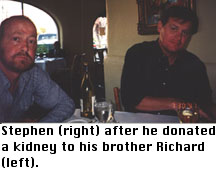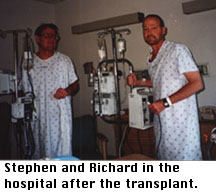

An Honor and A Privilegeby Stephen Finn Background In February 1996, my twin brother--Richard--was admitted to Alta BatesMedical Center (Berkeley, CA) on an emergency basis. When I arrived at Alta Bates, Richard was in critical condition with total renal failure. Later that week, he was diagnosed with Wegener's Granulomatosis. Wegener's is an uncommon disease with no known cure. Its clinical manifestations include lung lesions that many times result in an initial mis-diagnosis of TB which was the case with Richard. A study indicates that Wegener's affects the kidney 77% of the time and unfortunately this also happened. Richard was released from Alta Bates in mid-March (1996), but his kidneys were not functioning and consequently he was on dialysis. PretransplantIn March 1997, Richard registered with Alta Bates Transplant Center and they contacted me as a possible living kidney donor. On my part, the decision to donate a kidney was easy; in fact, it was an honor to be asked and a priviledge to be able to do so. Each transplant center has its own protocol; Alta Bates assigns a transplant coordinator and has six steps that you proceed through with the understanding that you can be eliminated as a donor at anytime. My coordinator--Ellen--was professional, compassionate, and helpful during the entire process. From March (1997) through May, the first 3 steps were completed. This involved blood typing,tissue typing and crossmatching;this work was done in Columbus and sent to Alta Bates. On June 3, Ellen called to say that "step #3" had been satisfactorily completed (tissue typing and crossmatching). This meant that my kidney would be a good match for Richard and that, most likely, I would be the donor. When I heard this, it felt like I had won the lottery. (Sidebar -- It is only with identical twins that the match is a sure thing. Richard and I are fraternal twins.) On June 16, Ellen called to say that the transplant had been tentatively scheduled for July 22, and I would need to be in California on July 5 to complete "steps #4 and #5." I arrived in California on July 5, and stayed at the Claremont Resort which is a 10 minute walk from Alta Bates. My first test was scheduled for Sunday, July 6; on July 10, an IVP and Arteriogram were performed to determine which kidney they were going to take. (It was decided they would take the left one.) These tests take 30 minutes, but because they cut into a major artery, you remain at the hospital all day (7 a.m. to 5 p.m.). From 9 a.m. until 4:30 p.m., I was on my back unable to move. That afternoon (in post-op) Dr. William Bry, who would perform the transplant,introduced himself. The next day I flew home with the understanding that I would return on July 20. The TransplantOn July 21, Richard and I had a day of pre-op testing where they re-did almost all the tests that had been done during the previous three months. That afternoon, Kathleen arrived and we spent a quiet night together at the Claremont. The next day, Kathleen and I arrived at Alta Bates at 6 a.m.; my surgery was at 7:45 a.m. Richard arrived at 7:30 a.m. His surgery was scheduled for 12:30 p.m. (sidebar -- a kidney transplant is more severe on the donor than the recipient, and tends to be more severe on a male donor than a female donor. The reasons for this are: the transplanted kidney is not placed in the recipient where it anatomically belongs thus eliminating the need to break ribs, etc. And 90% of the time, with male donors it is necessary to "break" one or two ribs in order to get to the kidney; with female donors, the ribs are broken about 10-15% of the time.) I had never had a general anesthetic and therefore was very anxious. The anesthesiologist suggested that he give me some Valium to calm me. The next thing I remember is him saying,..."It's over."... My operation lasted 5 1/2 hours (which is normal). They didn't break my ribs, but did cut 3" inches off of one. I was in my room by 3 p.m., but don't remember much until about 6 p.m. Kathleen was there and told me that everything had gone well with Richard; he was in intensive care (again, this is normal). A good sign was that his new kidney (my old kidney) was producing urine almost immediately. Post Transplant I was hooked up to a number of IV's and could only eat ice chips for two days, but there was no pain. I was walking on Wednesday; also on Wednesday, Richard was moved from the ICU to the renal floor. Intentionally we were in different rooms so we would get up and walk to see each other -- which is what I did. In fact, beginning Wednesday night, I walked and walked and walked (every hour throughout the night). On Thursday, I put on shorts and went down to the cafe and got coffee. From Wednesday thru Friday, there were a steady stream of visitors; actually the only visitors I knew were Kathleen and Judith (Richard's wife), but a number of Richard's friends stopped in to say, "Hello." we were released on Saturday. I went back to the Claremont and spent the next few days resting and walking. Wednesday night (eight days after the transplant), Richard, Judith, Brandon (their eight-year-old son), and I went to dinner. I flew home on July 31. Richard is doing well and I expect to resume normal activity by November 1. Final Thoughts, Comments, etc.I would like to make this out to be some big deal, but it really wasn't. There was no pain, rather a little discomfort. I feel very fortunate to be given an opportunity to help my brother and would highly recommend it to others if the situation develops. I want to thank Kathleen for all her support, all my friends who offered prayers and words of encouragement, the very fine people at Alta Bates Kidney Transplant Center -- particularly Ellen who was so understanding and patient with all my questions, and the staff at the Claremont who helped in numerous ways. Stephen Finn |
